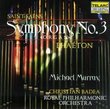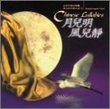| All Artists: Anton Bruckner, Yakov Kreizberg, Vienna Symphony Orchestra Title: Anton Bruckner: Symphony No. 7 [Hybrid SACD] Members Wishing: 1 Total Copies: 0 Label: Pentatone Original Release Date: 1/1/2005 Re-Release Date: 7/19/2005 Album Type: Hybrid SACD - DSD Genre: Classical Style: Symphonies Number of Discs: 1 SwapaCD Credits: 1 UPC: 827949005169 |
Search - Anton Bruckner, Yakov Kreizberg, Vienna Symphony Orchestra :: Anton Bruckner: Symphony No. 7 [Hybrid SACD]
![Anton Bruckner: Symphony No. 7 [Hybrid SACD]](https://nationalbookswap.com/cd//l/10/7310/6127310.jpg) | Anton Bruckner, Yakov Kreizberg, Vienna Symphony Orchestra Anton Bruckner: Symphony No. 7 [Hybrid SACD] Genre: Classical |
Larger Image |
CD DetailsSimilarly Requested CDs |
CD ReviewsFabulous recording can't displace this conductor's idiosyncr Larry VanDeSande | Mason, Michigan United States | 04/27/2007 (3 out of 5 stars) "With the passing of Gunther Wand and Georg Tintner in the last decade, there ended (perhaps interrupted) a long line of Bruckner specialists that had dominated the recorded symphonic reportoire since World War II starting with Furtwangler through Karajan, Bohm, Jochum and the above-named pair. Today, only Barenboim and Haitink are living legends that have recorded all the Bruckner symphonies and neither could arguably be included in the long line of principally German conductors that specialized in the composer and titlated audiences with their concert and recorded versions of his symphonies for the past six decades. Yakov Kreizberg, a native to St. Petersburg, Russia that emigrated to U.S.A. in 1976 where he worked under Bernstein, Ozawa, Leinsdorf and Tilson Thomas, would like to fill that gap and become one of today's "name" conductors of Anton Bruckner. This recording was made in concert in the Vienna Konzerthaus in 2004 and was recorded in dazzling super audio multichannel sound by Pentatone. The recording technology is fabulous, whether you are listening in stereo or in super audio, where the dimension of sound and space expands even more magnificently. The sense of spatial spread for the orchestra is greater in super audio and the sound envelops your listening area whether or not you have your equipment arranged for surround sound. It is a stupendous recording that brings separation to the instruments in Bruckner's brass chorales that I have never before heard. It is something very special, as someone else in these parts has said. However, as I suggest in the title line, even the most resplendent recording cannot hide faults of execution when interpreting the score. Kreizberg seems grounded in the philosophy of late Romantic German music and the notes suggest he has been very successful in English opera. On the basis of this recording, he has been influenced by Eugen Jochum's way with Bruckner for his principal leadership affect is to induce variance in the tempo from section to section within movements. When Jochum did this -- as he did when he sequentially sped up the chase at the end of the first movement of the Symphony No. 1 on DG, then slowed it down again after the peak in the line as the sound subsided -- the device had a natural quality that made it part of the organic makeup of the score. When Kreizberg does same, it seems more a tactical decision than an ingrained part of the composition. It appears to be a conductorial add-on that changes the pace of the music similar to idiosyncracies from the likes of Harnoncourt in his more disurbing moments. I can imagine him leading practice saying, "Continue at this pace until orchestra note B, where we will slow down about 10 points, and return a tempo four bars hence." For me, this technique puts an artificial halo over the performance. I think it adds little to the overall effect while it took this listener's attention away from the musical flow. Almost every time this happened -- and Kreizberg regularly employs this method in movements 1, 2 and 4 -- I stopped to think about what was going on instead of simply listening to the music. For me, it created a disturbance that mocked the natural progression of the musical line. Only in the scherzo does Kreizberg eschew this technique. I think it no coincidence that this is the most successful section of the recording. He returned to the tactic most egregiously in the last five minutes of the symphony where it is induced in almost every pharse, changing the pace from about 95 to 70, back to 95, back to 75, and on and on. In addition, this ultra-rubato forces the finale to be too fast, draining it of the majesty necessary for successful completion of the symphony. It's too bad about that, for the Vienna Symphony Orchestra -- still no match for the Vienna Philharmonic by its account here -- is with him all the way and the players vest great heart and energy in this performance. The recording helps enormously but also shows the small faults that separate this from a world class orchestra of the top rank -- secondary brass players don't always carry their weight in quieter moments, an occasional sour woodwind can be heard in the final movement, and either the timpanist is using padded sticks or there was no microphone very close to the drums, or both, for they seem consistently distant and mild-mannered. But that recording is a winner. Anyone not bothered by anything I've written that's willing to put out $20 for this 65-minute rendition of Bruckner's most popular symphony will probably be very happy with this. For audiophiles, it is mandatory listening. But for collectors like me, who have grown up on Bruckner from Furtwanger, Karajan, Bohm and Jochum, this is junior achievement at best. I'm sure Kreizberg will record more Bruckner; let's hope he settles into a better overall rhythm next time." What a surprise! What a wonderful performance, What a wonde Bruce Zeisel | Albany, NY United States | 07/01/2006 (5 out of 5 stars) "Back in the mid fifties I borrowed a Bruckner 7th from the Enoch Pratt Library. It was an old Vox recording and well worn. I didn't get much out of it, but tried again when the Solti in stereo with the Vienna Philharmonic was offered on London Records. That was better. Still I never thought the remaining 3 movements lived up to the promise of the first movement - not through 40 some years of buying each new recording as it became available, Bohm, Karajan, none of them seemed satisfying beyond the first movement.
I almost didn't buy this one, but I am ever glad I did! Here is the performance and the recording I had wanted to hear all along. The performance is perfect with lovely strings and well characterized woodwind and brass. The huge rolling climaxes are effortlessly reproduced without strain and Kreizburg has the feeling for this music that has eluded all others! The most amazing thing is the "surround sound"! We are not surrounded by instruments here - that is not what surround sound (as realized by PentaTone at least) means. We are enveloped in the acoustic of the hall where the music was recorded, and this experience is absolutely phenomenal! Go get it! If you need to buy some new equipment to augment your stereo so you can do this justice, well its about time you treated yourself to concert hall sound in your living room!" |


